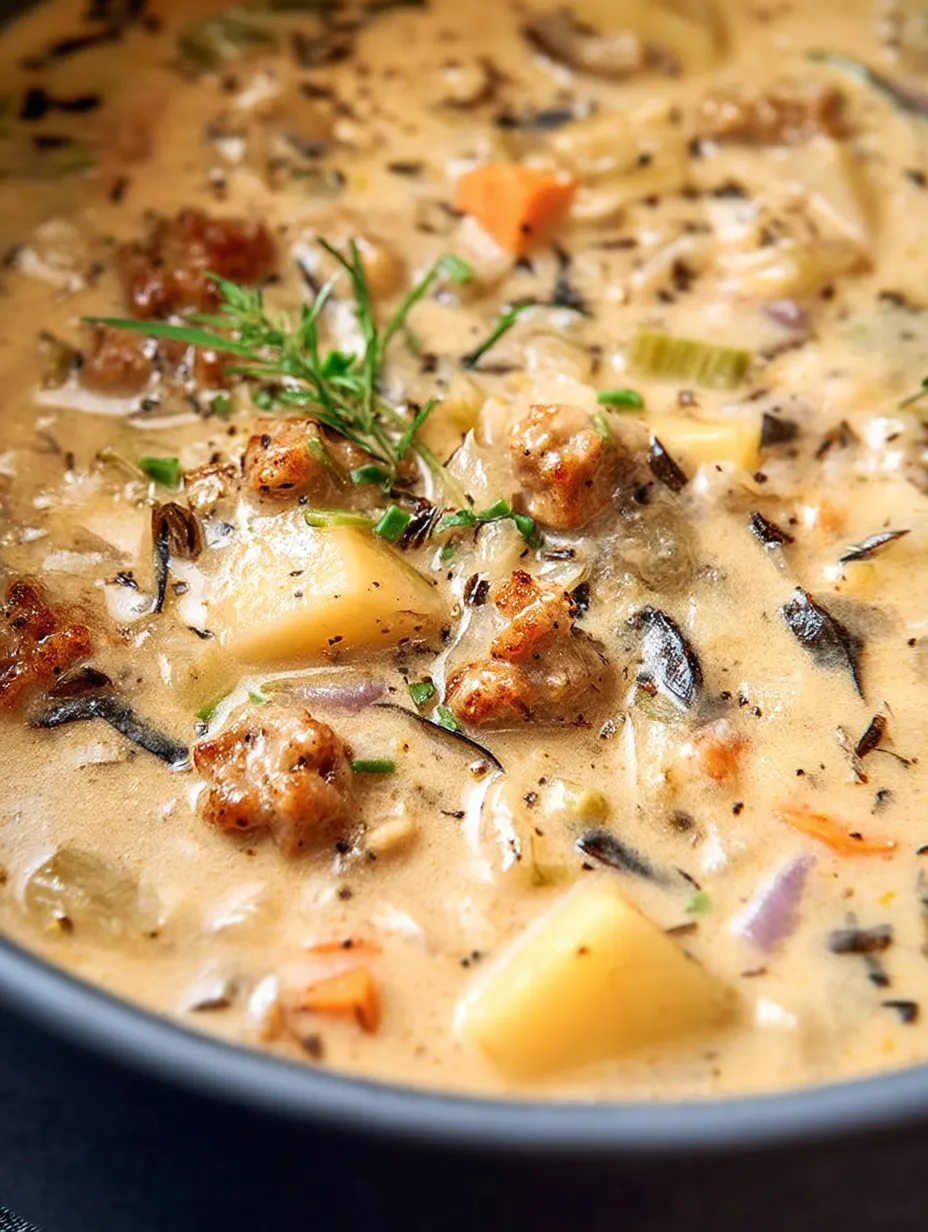 Pin it
Pin it
This hearty sausage and potato chowder turns basic kitchen staples into a bowl of pure comfort that'll warm you right up. Unlike seafood-based versions, this robust variation uses flavorful sausage instead of clams, making a down-to-earth yet impressive soup. The mix of smooth broth, soft potatoes, and tasty sausage builds a wonderful combo of textures and flavors as it cooks. Every spoonful gives you that perfect balance of creaminess with savory meat and earthy potatoes, making it just what you need when the weather turns cold and only something homemade will hit the spot. What's really great about this chowder is how flexible it is – the simple foundation of potatoes and cream lets whatever type of sausage you're in the mood for today really shine through.
I came up with this chowder during a freezing winter when I wanted something comforting like traditional chowder but didn't have any seafood around. I tried using some Italian sausage from my freezer instead, and was blown away by how the sausage's richness and seasonings made the whole pot taste amazing in ways seafood often can't. The biggest shock was when my seafood-crazy husband asked for this version instead of our usual clam chowder for our Sunday meals. The mix of that creamy, potato-thickened broth with tasty sausage makes something that feels both fancy and homey – it's one of those rare dishes that works just as well for family dinners as it does when you've got company over.
Must-Have Ingredients
- 1 pound sausage: Adds rich depth and filling protein
- 1½ pounds potatoes: Makes up the satisfying, cozy base
- 1 large onion: Forms the tasty flavor foundation
- 2 celery stalks: Brings light crunch and veggie flavor
- 2 cups chicken stock: Creates the flavorful liquid base
- 1½ cups cream: Gives that smooth, velvety texture
The sausage you pick will really change how your chowder turns out. For something everybody will like, go with a mild pork sausage with herbs. If you're feeling bold, try a smoked option like kielbasa or andouille to get those deep, woodsy flavors that go so well with the creamy base. For potatoes, using a mix works best – something like Russets will break down a bit to naturally thicken your chowder, while firmer types like Yukon Golds stay chunky for that satisfying bite. Fresh herbs make a big difference, especially thyme, which just naturally goes well with both potatoes and sausage.
Easy Cooking Method
- Sausage Preparation:
- First, pick your favorite sausage – could be plain pork with herbs, spicy Italian, or smoky kielbasa. If you're using links, cut them open lengthwise and pull off the casing. Break the meat into bite-sized chunks so it'll spread evenly through your chowder. Put a big, heavy pot over medium heat. Toss in the crumbled sausage (no oil needed) and cook until it's nicely browned and a bit crispy on the edges, about 7-9 minutes. You want those tasty brown bits stuck to the bottom – that's where the flavor lives. Use a slotted spoon to move the cooked sausage to a paper towel-lined plate to drain, but keep about 2 tablespoons of the sausage fat in the pot. That fat is packed with flavor that'll make your veggies taste amazing.
- Vegetable Base Development:
- In that reserved sausage fat, throw in one finely chopped large onion, two finely chopped celery stalks, and one chopped medium carrot if you want. Add a pinch of salt to help draw out moisture and speed up softening. Cook over medium heat until everything's soft but not brown, about 5-7 minutes, stirring now and then. This slow cooking makes the veggies sweeter and builds flavor. Add 2-3 minced garlic cloves and cook another 30 seconds until you can smell it, but don't burn it or you'll get bitterness. Sprinkle 3 tablespoons of all-purpose flour (or cornstarch if you can't have gluten) over the veggies and stir non-stop for about 2 minutes to cook out the raw flour taste. This will thicken your chowder for that creamy texture. For extra flavor, add 1 teaspoon fresh thyme leaves or ½ teaspoon dried, and ¼ teaspoon fresh ground black pepper now.
- Liquid Integration:
- Slowly pour in 2 cups of chicken stock, stirring all the time so you don't get lumps in the flour mixture. Use a wooden spoon to scrape up all those brown bits from the bottom – that's concentrated flavor for your broth. Add 1½ pounds of potatoes, peeled and cut into ¾-inch cubes. For the best texture, try using some starchy potatoes (like Russets) and some waxy ones (like Yukon Golds) – the starchy ones will partly break down to thicken things up while the waxy ones keep their shape. If you want to add wild rice or another grain, put in ½ cup now – it'll cook with the potatoes, soaking up all that tasty broth. Bring everything to a gentle boil, then lower the heat to a simmer. Partly cover with a lid and cook for 15-20 minutes, or until you can easily pierce the potatoes with a fork and the rice (if using) is cooked. Stir occasionally so nothing sticks and the potatoes cook evenly.
- Creaminess Development:
- Once your potatoes are just right, it's time to make it rich and creamy. Pour in 1½ cups of heavy cream or half-and-half, stirring gently to mix it in. If you want it thicker with more body, use a stick blender to partially puree some potatoes – just enough to thicken while keeping plenty of chunks for texture. Or you can take out about 2 cups, blend it in a regular blender, and put it back in the pot. Now add the cooked sausage back in, gently stirring so it's spread evenly throughout. Turn the heat to low and let everything simmer gently for another 5-10 minutes so the flavors can mingle and the sausage can warm back up. Don't let it boil after adding cream or it might separate. Taste it and add more salt and pepper if needed – how much depends on how salty your sausage and chicken stock already are.
- Finishing and Serving:
- Just before you're ready to eat, add those final touches that make good food great. If you want, stir in 1 cup of fresh or frozen corn kernels for sweet pops of texture and color, letting them heat through for 2-3 minutes. Add a tablespoon of fresh chopped parsley or chives for bright color and fresh flavor against the rich background. Serve the hot chowder in warmed bowls – warm bowls keep it hot longer. Top each serving with a bit more fresh herbs, a light dusting of smoked paprika for color and flavor, or a few turns of black pepper. This chowder goes perfectly with crusty bread for dipping or a simple side salad with vinaigrette dressing to cut through the richness. Serve it piping hot for the best experience – that contrast between steaming chowder and each cool spoonful is part of what makes it so comforting.
 Pin it
Pin it
I've tried so many different versions of this chowder over the years, changing it up based on what's in my fridge or pantry. What always amazes me is how such a basic combo of potatoes, sausage, and cream can turn into something that tastes like it took forever to make. My best version happened by accident when all I had was smoked sausage and sweet potatoes – the smoky meat with the slight sweetness of the potatoes created this amazing depth of flavor that we now make regularly. What's great about this dish is how forgiving it is; even when I've had to swap ingredients, it always delivers that cozy satisfaction that makes it perfect for both regular weeknight meals and special get-togethers.
Picking Your Perfect Sausage
Take your chowder to the next level by choosing just the right sausage to match what you're in the mood for and who you're feeding. For a family-friendly version everyone will enjoy, go with a mild pork sausage with herbs like sage and thyme, which gives familiar flavors that work with the creamy potato base without being too strong. When you've got adventurous eaters coming over, try Spanish chorizo or Portuguese linguiça, whose paprika flavors add beautiful color and gentle heat that turns the chowder into something surprisingly sophisticated. For busy weeknights, fully-cooked smoked sausages like kielbasa save you time while adding deep, smoky notes that make the chowder taste like it's been simmering all day. If you're watching calories, chicken or turkey sausage varieties work great too, with less fat but still plenty of flavor, especially ones with herbs like rosemary and garlic. For a truly special meal, fancy game sausages with venison or wild boar create a rustic, earthy chowder perfect for winter gatherings. The best thing about this basic recipe is how flexible it is – almost any good-quality sausage will make something delicious, so you can pick based on what's available, your diet needs, or just what flavor adventure you're up for today.
Getting That Perfect Texture
Make your chowder just right by finding that sweet spot between creamy and chunky that makes the texture so satisfying. For a classic creamy chowder with noticeable chunks, cook the potatoes just until you can stick a fork in them, but don't overcook or they'll fall apart and turn mushy. If you like a thicker, more substantial base, use a stick blender to partially mash about a third of the chowder, leaving plenty of visible pieces while creating a thicker texture without adding more thickeners. For interesting contrast in each bite, try adding things with different textures – firm potato chunks, smooth creamy base, chewy sausage bits, and maybe the light pop of corn kernels or the slight crunch of barely-cooked celery. Adding wild rice, with its unique chewy texture and pretty appearance, brings another dimension that makes the chowder more than just an ordinary soup. For maximum creaminess without heaviness, swap half the cream for evaporated milk, which gives richness with less fat and prevents that too-heavy feeling you can get from all-cream bases. Whatever style you prefer, remember that chowder should be substantial enough to be a meal on its own, with a spoon that doesn't slip through thin liquid but instead catches different tasty elements in each mouthful.
Boosting The Flavor
Make your chowder taste even better with simple add-ins that work well with the sausage and potato base. For deeper flavor, add a tablespoon of tomato paste when cooking the veggies, which brings rich umami notes that make the meaty flavors pop without making it taste like tomato soup. If you love herbs, try adding a bouquet garni (bay leaf, thyme sprigs, and parsley stems tied together) while it simmers, then take it out before serving for subtle herby notes without floaty bits in your soup. For extra coziness in cold weather, add half a teaspoon of smoked paprika or a quarter teaspoon of cayenne when cooking the veggies, creating a gentle warmth that builds with each spoonful without overpowering the creamy base. If you want to balance the richness, finish the chowder with a teaspoon of fresh lemon juice and a tablespoon of chopped fresh dill just before serving, adding bright flavors that keep it from feeling too heavy. For a fancy touch, after cooking the veggies, pour in a quarter cup of dry white wine and let it cook down before adding the stock, which adds a restaurant-quality tang and complexity. These simple extras barely take any extra effort but can make your basic recipe into something uniquely yours and memorably tasty.
How To Serve It Up
Make this filling chowder into a complete meal experience with thoughtful sides and serving ideas. For a fun family dinner, serve the chowder in hollowed-out sourdough bread bowls, which not only looks impressive but also gives you edible bowls that soak up all that creamy goodness. Create a quick but nice weeknight dinner by serving smaller amounts of chowder with a fresh green salad with tangy dressing, the brightness and crunch perfectly balancing the rich soup. When you're having friends over, serve the chowder as a starter in warmed cups instead of bowls, topped with a small crunchy crouton, a sprinkle of aged cheese, and a tiny sprig of fresh thyme for an elegant beginning to your meal. During cold months, set up a make-your-own chowder station with the base soup and various toppings like bacon bits, different cheeses, chopped herbs, and hot sauces, letting everyone customize their own bowl. For a complete one-dish meal that doesn't need anything else, stir in two cups of finely chopped kale or spinach during the last few minutes of cooking, adding color, nutrients, and texture that rounds out the meal while keeping that comforting appeal.
 Pin it
Pin it
This potato and sausage chowder has become my go-to answer for those nights when only real comfort food will do. What started as a practical substitute for seafood chowder has grown into a recipe I value for how adaptable it is and how it always hits the spot. I especially love how it works for both everyday and special occasions – simple enough for a random Tuesday family dinner but impressive enough for guests when made with good ingredients and served thoughtfully. The magic that happens when basic potatoes, flavorful sausage, and cream come together reminds me that often the most satisfying foods aren't about complicated techniques or hard-to-find ingredients, but about understanding how simple things can come together to create something that feels like a warm hug in a bowl.
Frequently Asked Questions
- → Can I swap out the sausage for a different kind?
- Of course! Use Italian sausage for extra herbs, try smoked kielbasa for a smoky kick, or even breakfast sausage. Adjust spices to suit the flavors of your pick.
- → Is there a way to skip the dairy?
- Definitely! Use coconut milk or plant-based cream, like oat or soy. It won’t be as rich, but it’ll still be creamy. Add extra seasoning if needed.
- → How long can I keep this chowder in the fridge?
- It’ll stay fresh in an airtight container for 3-4 days. Many say it tastes even better after resting overnight. Reheat gently and add a splash of stock if it thickens too much.
- → Can this chowder go in the freezer?
- Yes, but cream soups may separate. Freeze without adding the cream, then add it fresh when reheating. If already creamy, warm gently, stirring to bring it back together.
- → What pairs well with this hearty chowder?
- Dip crusty sourdough or baguettes into the soup. Pair it with a crisp salad or even a cheesy sandwich for a more filling meal.
